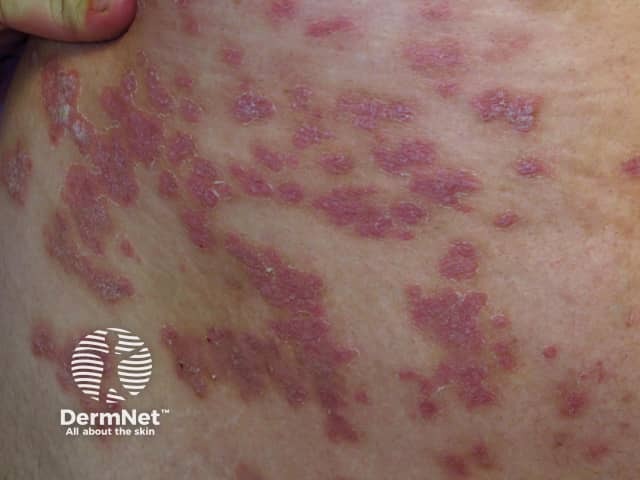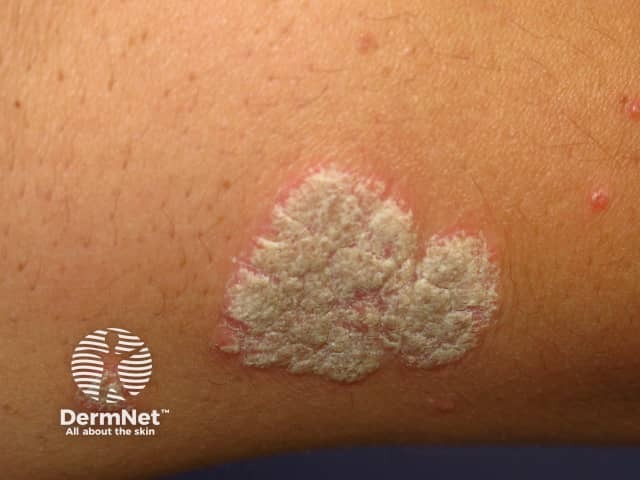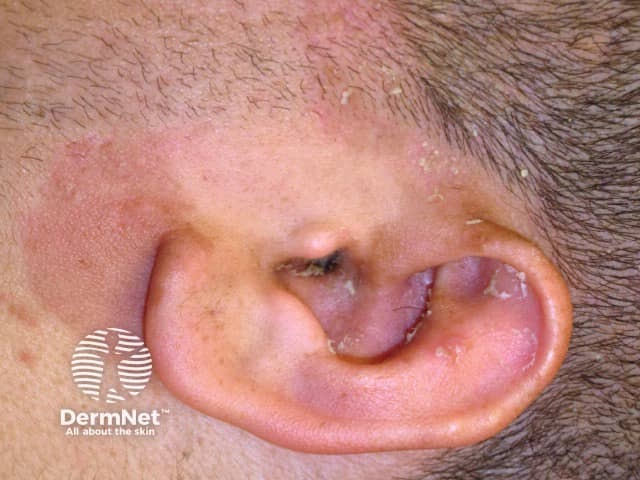Main menu
Common skin conditions

NEWS
Join DermNet PRO
Read more
Quick links
Drug-induced psoriasis — extra information
Reactions Autoimmune/autoinflammatory
Drug-induced psoriasis
Author: Brian Wu, MD candidate, Keck School of Medicine, Los Angeles, USA. DermNet New Zealand Editor in Chief: Hon A/Prof Amanda Oakley, Dermatologist, Hamilton, New Zealand. Copy editor: Maria McGivern. June 2017.
Introduction - psoriasis
Introduction
Demographics
Causes
Clinical features
Diagnosis
Treatment
Outcome
What is psoriasis?
Psoriasis is a common chronic skin condition characterised by symmetrically distributed, well-defined scaly plaques. The most common type of psoriasis is chronic plaque psoriasis, which often starts in early adult life.
What is drug-induced psoriasis?
In some people, psoriasis is drug-induced or drug-aggravated.
- In drug-induced psoriasis, discontinuation of the offending drug leads to the clearance of psoriasis. It occurs in patients with no previous history of psoriasis.
- In drug-aggravated psoriasis, the disease continues to develop even after the causative drug has been discontinued. It typically occurs in patients with a personal or family history of psoriasis.
These forms of psoriasis differ from psoriasiform drug eruption, a group of papular drug eruptions characterised histologically by epidermal hyperplasia and hypergranulosis.

Psoriasis induced by lithium

Psoriasis induced by lithium

Psoriasis induced by lithium
Who gets drug-induced psoriasis?
As with psoriasis that is not induced by a drug, drug-induced psoriasis occurs more frequently in patients with a history of:
- Obesity
- Smoking
- Diabetes
- Hypertension
- Dyslipidaemia (metabolic syndrome).
Other risk factors for psoriasis include:
- Race — psoriasis occurs in all races, but it is more common in Caucasians than in those of African descent
- A family history of psoriasis
- Age — the most common ages for the onset of psoriasis are 16–22 years and 57–60 years.
What causes drug-induced psoriasis?
The most common drugs to induce or aggravate psoriasis are:
- β-blockers (in 20% of patients with psoriasis, eg, propranolol, metoprolol, bisoprolol)
- Lithium (in 50% of patients with psoriasis) and less often, other medications that are given to improve mood
- Antimalarial drugs (eg, hydroxychloroquine, chloroquine, quinacrine)
- Antibiotics (eg, amoxicillin — but it may be the infection for which the antibiotic is prescribed that is the cause)
- Non-steroidal anti-inflammatory drugs (NSAIDs) including indomethacin and aspirin
- Angiotensin-converting enzyme (ACE) inhibitors
- Terbinafine
- Tumour necrosis factor-alpha (TNF-α) inhibitors, for more information see paradoxical psoriasis.
Other common triggers for psoriatic exacerbations include trauma, sunburn, streptococcal infection, human immunodeficiency virus (HIV) infection and emotional stress.
Immunotherapy-related psoriasiform reactions can also occur.
What are the clinical features of drug-induced psoriasis?
Drug-induced or drug-aggravated psoriasis may induce:
- Localised plaque psoriasis, often affecting scalp, knees, elbows, buttocks and/or genitals
- Generalised plaque psoriasis, with scattered plaques on all parts of the body
- Erythroderma when the entire skin surface is red and scaly.
Acute generalised exanthematous pustulosis (AGEP) is a severe drug-induced eruption that closely resembles generalised pustular psoriasis.
Palmoplantar pustulosis can also be drug-induced, often by tumour necrosis factor inhibitors. Although closely related, palmoplantar pustulosis is no longer classified as a type of psoriasis. It nearly always occurs in smokers.
How is drug-induced psoriasis diagnosed?
Diagnosis of drug-induced psoriasis can be challenging when patients are on multiple medications. The onset of psoriatic symptoms can be months or years after the drug has been started. Careful patient history is essential in any patient that presents with new-onset psoriasis and must include their current medications. The possibility of other triggers for psoriasis, apart from drugs, should also be taken into consideration.
How is drug-induced psoriasis treated?
The standard of care in the case of drug-induced psoriasis is to discontinue the offending drug. However, this is not always possible; for example, in a patient with severe depression that is well controlled by lithium where other options have been ineffective or contraindicated.
Treatments for psoriasis include:
- Emollients
- Topical corticosteroids
- Vitamin D analogues such as calcipotriol
- Phototherapy
- Acitretin
- Immune modulators such as methotrexate, ciclosporin, mycophenolate
- Biologics.
What is the outcome for drug-induced psoriasis?
While some cases of drug-induced psoriasis can resolve within weeks of stopping the causative medicine, in other cases, it can take much longer to resolve or not resolve completely.
References
- Abel, EA. Diagnosis of drug-induced psoriasis. Semin Dermatol 1992;11: 269–74. PubMed.
- Kim GK, del Rosso JQ. Drug-induced psoriasis: is it drug-induced or drug-aggravated? J Clin Aesthet Dermatol 2010; 3: 32–8. PubMed Central.
- Schalock PC. Psoriasis. Merck Manuals. 2016. Available at: www.merckmanuals.com/professional/dermatologic-disorders/psoriasis-and-scaling-diseases/psoriasis (accessed 19 October 2016).
- Buckley L, et al. Abstract #1816. Psoriasis associated with anti-tumor necrosis factor-alpha therapies in children with inflammatory bowel disease, juvenile idiopathic arthritis, and chronic noninfectious osteomyelitis. Presented at: American College of Rheumatology/Association of Rheumatology Professionals Annual Meeting; Nov. 9-13, 2019; Atlanta. Meeting news.
On DermNet
- Psoriasis
- Chronic plaque psoriasis
- Plaque psoriasis
- Generalised pustular psoriasis
- Paradoxical psoriasis
- Adverse cutaneous drug reactions
- Drug eruptions
- Immunotherapy-related psoriasiform reactions
- Antimalarial medications in dermatology
Other websites
- Hong J, Bernstein D. A review of drugs that induce or exacerbate psoriasis. Psoriasis Forum. 2012 (PDF file).
